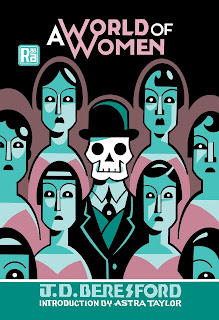Of course, the editors must have thought they had struck gold when they saw what it featured - a pandemic (described as a plague) that starts in China then spreads relentlessly around the world. There is particular resonance early on with Covid, when John Davys Beresford gives us a debate between the economics of staying open to the world and the potential benefit of closing borders immediately. But there is one huge difference with a real pandemic - this plague is almost always deadly for men, but spares most women.
This gives Beresford the opportunity in this his second novel, dating back to 1913 (he would go on to write until the 1940s) to pull apart the stuffy attitudes of Edwardian society and to consider ways in which he thought women would do things differently, on top of the usual post-apocalyptic 'how will an industrialised society survive without any of the usual services?' question. We see many dying of starvation before a return to the land and a medieval-level agricultural existence becomes common.
There are some problems. Apart from the boring bits of exposition, despite his relative modernity on such things as sex outside marriage, Beresford is mired in the antisemitism, and class and gender prejudices, of his age. He claims that in the new society the old ideas of class don't matter, describing titled ladies working in the fields alongside farmers' widows - yet his portrayal of the Goslings, the central family in the story, (the book was originally called The Goslings) is riddled with the author's casual disdain for the intelligence of the working class, and the idea that women would find it difficult to understand anything requiring logic, not helped by a painful attempt to spell out a cockneyish accent worthy of Dick van Dyke in the family's speech.
There's also a fudged ending that is distinctly uninspiring. However, this is a genuinely interesting SF novel with what was, for the period, particularly original thinking. It's a real asset to the series.
| Paperback: |
| Bookshop.org |




Review by Brian Clegg-See all of Brian's online articles or subscribe to a weekly digest for free here


Comments
Post a Comment